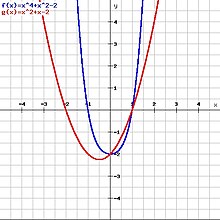Substitution (math)
In mathematics, substitution is generally understood to mean the replacement of one term by another with the aim of converting the initial term into an easily solvable standard form. The substitution is used, among other things, to solve biquadratic equations or to determine integrals by means of substitution .
example
The following example uses substitution to determine the solution set of a given biquadratic equation or the zeros of an entirely rational function or a polynomial of the 4th degree.
the equation
can be identified by the substitution in
convict. This quadratic equation can now be solved using standard methods such as the pq formula . The solutions and . Back substitution gives for the equations
with the solutions and as well
with the complex solutions and . The output equation thus has as a solution set in or in .
See also
Individual evidence
- ↑ Jan Peter Gehrk: Mathematics Study: Bridge course for economic and natural sciences . R. Oldenbourg Verlag , Munich 2010, ISBN 978-3-486-59910-7 , p. 116-117 .
















